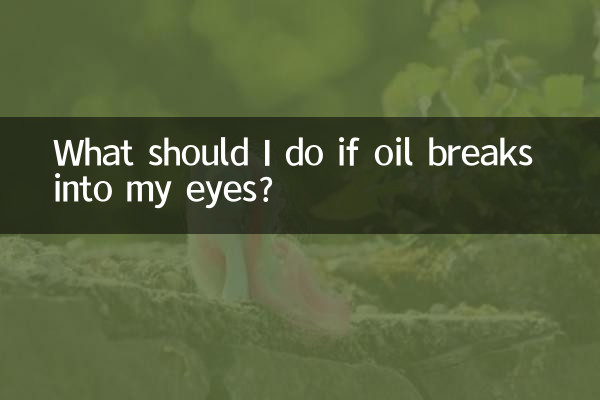What should I do if oil breaks into my eyes?
In daily life, oil splashing into the eyes while cooking is a common accident. If not treated in time, it may cause eye discomfort or even damage. This article will explain in detail how to deal with the emergency situation of oil collapsing into the eyes, and provide relevant data and suggestions.
1. Emergency treatment steps for oil collapsing into eyes

| steps | Specific operations | Things to note |
|---|---|---|
| 1. Stop the activity immediately | Immediately stop cooking or contact with oil | Avoid rubbing your eyes to prevent further damage |
| 2. Rinse with clean water | Flush eyes with plenty of water (room temperature) for at least 15 minutes | Use an eyewash station or slowly pouring water |
| 3. Check your eyes | Gently open your eyelids to check for any residual oil stains | Be gentle with your movements to avoid secondary injuries |
| 4. Seek medical treatment | If you still feel unwell, go to the hospital’s ophthalmology department immediately | Bring samples of the cooking oil used (if necessary) |
2. Comparison of the hazards of common edible oils to the eyes
| oil | boiling point | Eye hazard level | Suggested handling |
|---|---|---|---|
| Vegetable oil (such as canola oil) | about 200°C | medium | Rinse immediately |
| Animal oil (such as lard) | about 180°C | higher | It is recommended to seek medical advice after flushing |
| olive oil | About 190°C | medium | Rinse immediately |
| High temperature frying oil | up to 230°C | extremely high | Must seek medical attention immediately |
3. Measures to prevent oil from splashing into eyes
1.Use protective tools:Wear goggles or glasses when cooking to effectively block oil splashes.
2.Control oil temperature:Avoid heating the oil too high. When the oil starts to smoke, the temperature will exceed the safe range.
3.Correct operation:When placing ingredients in the pot, try to lower the height as much as possible and use the pot lid to cover it to reduce the chance of oil splashing.
4.Keep your distance:Keep an appropriate distance between your body and the pot, and do not put your face directly into the pot.
4. Common symptoms and responses after oil splashes in the eyes
| Symptoms | Possible reasons | Recommended treatment |
|---|---|---|
| slight stinging | Oil droplets irritate | Continuous flushing and observation |
| persistent redness and swelling | Corneal damage | seek medical attention immediately |
| blurred vision | serious injury | emergency medical treatment |
| Photophobia and tears | inflammatory response | Medical examination |
5. Error handling methods and consequences
1.Rub your eyes:It may cause scratches on the cornea and aggravate the damage.
2.Use non-professional eye drops:Some eye drops may aggravate irritation and should be used as directed by your doctor.
3.Delay processing:It may aggravate inflammation and affect recovery.
4.To remove foreign objects yourself:Improper operation can easily cause secondary injuries.
6. Suggestions for handling special situations
1.Contact lens wearers:Contact lenses should be removed immediately and rinsed.
2.Child injured:It is necessary to calm down, rinse carefully, and seek medical treatment as soon as possible.
3.Large amount of oil splashed into:Flushing should be maintained until the ambulance arrives.
4.Chemical additive oils:This type of oil may contain irritating substances and requires special attention.
7. Recommendations for recovery care
| time | Nursing measures | Things to note |
|---|---|---|
| 0-24 hours | Use eye drops/ointments as directed by your doctor | avoid rubbing eyes |
| 1-3 days | Reduce eye use and avoid bright light | Not wearing contact lenses |
| 3-7 days | Regular review | Adjust medication as directed by your doctor |
| 1 week later | Gradually return to normal life | Pay attention to eye protection |
Through the above detailed treatment methods and preventive measures, I hope it will help you to respond correctly and protect your eye health when you encounter an accident where oil collapses into your eyes. Remember, prevention is better than cure. Paying more attention to your daily cooking can effectively avoid such accidents.

check the details

check the details